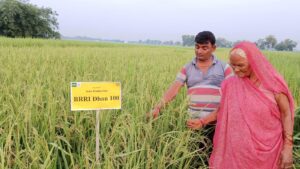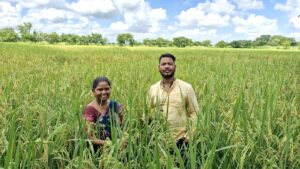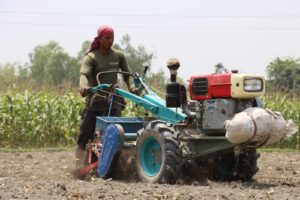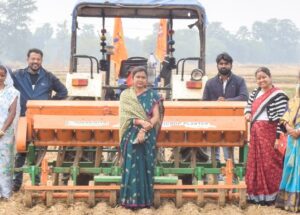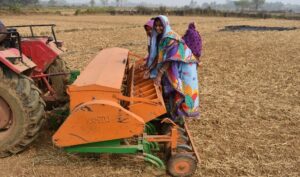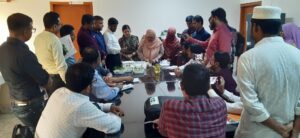
During my stay at IRRI, I really grew up. Coming from India Tamil Nadu Agricultural University where my father was based], I had the opportunity to interact with new cultures that I found to be friendly and warm. We were greeted with great smiles and were most fortunate to make some very good friends during our stay.
Although I was only 10 years old, I had the opportunity to observe many dedicated scientists at work. I was impressed with that dedication, exemplified by my own dad who was out of the house all day working very hard. In one way or another, all the scientists focused on one plant—a single crop, rice, which is the most important one in the whole world. I thought a lot about plants then. Plants play such important roles in our lives in many different ways besides just giving us food. It was for these reasons, the dedication of the IRRI scientists and the importance of plants, that I decided to become a scientist myself—specifically, a horticulturist.
IRRI provided our entire family with a unique opportunity to interrelate with new cultures and to learn about the world and the people in it. I look back at my time at IRRI and see it as one of the greatest periods of my life. I really matured as I had interactions with not only the great culture of the Philippines but also other cultures that were part of IRRI’s international community, including Koreans, Thais, and even Indians from different states in my home country whom I would not have had the opportunity to meet if my dad had left us in Tamil Nadu.
Warm local culture
I fondly remember the large trees with white flowers at IRRI headquarters and the green grass on which we would have picnics and share our snacks in the evening with my dad and his colleagues [see photo, below]. We would come to IRRI on the bus and enjoy the fountain, the lights, and the cool air-conditioned lounge. We came for the movies screened in the Chandler Hall Auditorium and were greatly appreciative of the gifts that we little kids would get at Christmas time.
The local people with whom we interacted were so kind. As Hindus, we never really appreciated Christianity or celebrated Christmas before coming to the Philippines. We stayed at the Gonzales Compound outside of IRRI and the landlady would knock on our door and offer us rice and different desserts. Since my mom is a vegetarian, our hosts made a point of offering us many vegetables and fruits that were growing in their gardens. We had great appreciation for the local culture, which is so very warm and friendly. I look back on this all with fond memories, enjoying it all.
A model for research
I returned to IRRI [in 2006] to look into including the Institute as a model of successful agricultural research outside the United States in a curricular development and innovation project I’m working on [funded by the U.S. Department of Agriculture/Cooperative State Research, Education, and Extension Service – International Science and Education Competitive Grants Program]. I hope to inspire young students to become agricultural scientists just as I once was years ago by my IRRI experience. IRRI can truly be an educational model to show that real-world issues and problems can be solved through science and research. Agriculture is the most basic of professions that has touched the lives of people since time immemorial, since antiquity. That will continue and it is very important that we keep the younger generation excited about agriculture and that they consider agriculture as a desirable career option. My effort here is to incorporate IRRI’s techniques in my curriculum design and university teaching. Many universities in the United States should be very excited about research that’s happening overseas and making students aware of it, as well as thinking about playing an important collaborative role in alleviating poverty through scientific efforts in agriculture.
A tribute to dad
My dad—my inspiration and role model in my life—was very passionate about rice. We both shared fervor for the plant sciences. He enjoyed watching farmers working in their fields in the early morning. As I have been living outside of India for a long time (in the United Arab Emirates since 1982 and the U.S. since 1994), I had not had much time with him. So, I took advantage of our summer 2006 excursion to IRRI. We went out for morning walks and watched the workers in the IRRI rice plots. His face would light up immediately as he would smell the air and start talking about the importance of agriculture in the human experience. During his scholar days at IRRI and the nearby University of the Philippines at Los Baños, he studied under Dr. Kwanchai Gomez, IRRI’s chief statistician [see Figures, fake guns, and fund-raising, on pages 16-19 of Rice Today Vol. 7, No. 4]. So, it was no surprise that, even 35 years later, he was quick to point out the importance of statistical methods in field experiments. He could immediately pick out an offtype in a plot and say how important it is to rogue a plot [remove infected or undesirable individuals from a pure population] that is being used for producing good seed or obtaining good experimental results. Dad was a self-made man who raised all his children to be scholars. He continued to learn and obtained his PhD. He held several key positions as department head of physical sciences at Tamil Nadu Agricultural University; professor of statistics at Khartoum University, Sudan; and an expert with the United Nations Economic Commission for Western Asia in Iraq. Since retirement, he was working on a book, Guidelines for rice researchers in the estimation of some plant parameters. I contributed some of the chapters and hope to complete it soon in his memory. He was in excellent health so his passing, due to the road accident in Coimbatore, was all too sudden for any of us to grasp as being real.
_______________________
Go to www.irri.org/publications/ today/Pioneer_Interviews.asp for this and other Pioneer Interviews as IRRI approaches its 50th anniversary in 2010.

